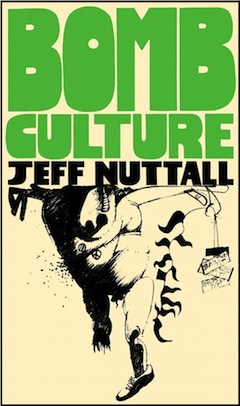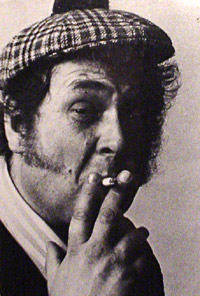In their introduction to a new edition of Bomb Culture, Jeff Nuttall’s classic 1968 manifesto about the ’60s counterculture, the editors write: “It’s hard to remember the last time the howl of an artistic movement was heard across international borders, when an all-encompassing and audacious subculture went on the rampage confronting the world’s established order, expressing itself in ways so disturbing and original it couldn’t be ignored.”

distributed by The MIT Press
In the era of #Metoo, amid the insurgency of rightwing “populists,” the normalization of neoNazis and neoFascists, the rise of the Yellow Vests, and with the memory of Tahir Square and the color revolutions still haunting us, you might pause to wonder about that claim. And then you say to yourself, name another “artistic movement” that has lately howled across the world. Have any been, as the editors Douglas Field and Jay Jeff Jones put it, “unmissable everywhere”? There’s hip hop and rap. There’s graffiti, comix, manga. All come out of audacious subcultures. All have had international impact. But have they been “all-encompassing”? Not in the larger scheme of things.
Nuttall writes in his preface to the original edition: “Actually, the plain and obvious fact is that between the autumn of ’67 when I completed this manuscript, and the summer of ’68 when I am writing this preface, young people, under various pretexts, made war on their elders, and their elders made war on them. ” He elaborates:
The political effectiveness of contagious culture is a subject abhorrent to orthodox thinking for various reasons, not least among which is the threat embodied in the emergent fact that the root of political development is creative and irrational.
Culture, being the broad effect of art, is rotundly irrational and as such is perpetually operating against the economic workaday structure of society. The economic structure works towards stasis centered around static needs. It is centripetal. Culture forces change centered around changing appetites. It is centrifugal.
The effect of culture has never been so direct and widespread as it is amongst the international class of disaffiliated young people, the provotariat. Consequently art itself has seldom been closer to its violent and orgiastic roots. . . . What is happening is an evolutionary convulsion rather than a reformation. Young people are not correcting society. They are regurgitating it.
That was then. Are young people today throwing up? I can think of some that are. Would there were more.






Today the economic structure has manipulated several ways to mute the affects of cultural upheaval. These include corporate hegemony and control of electronic methods of information and entertainment distribution; co-option of “renegade” artists, their images and works (I can’t get over “Sympathy for the Devil” and “My Favorite Things” being used as car ad soundtracks); demeaning of physical manifestations of “art,” I.e. turning access of music recordings into subscription services that promote renting rather owning and the accompanying identification with one’s possession ( also true of ebooks, in which there is no physical evidence of what you’ve bought and presumably absorbed). Reducing the income of artists via diminished royalties from streaming services and nonpayment from web postings makes it hard for newcomers to raise their profiles and reach more consumers, despite the low cost of publishing content. Writers, among independent creative individuals, have been particularly effected.
On the nose! Thanks for that.
Also, when it comes to “co-option of ‘renegade’ artists,” there is this: Some of them, including the biggest of them, have been complicit. See this:
http://www.artsjournal.com/herman/2015/06/of-poetry-and-fakery-cultural-theft-and-stolen-identity.html
It is Heathcote Williams on Bob Dylan:
“Unlike Dylan Thomas who never once sold out — who never ‘shilled’ for anyone — his deadly Doppelganger would prove as keen as mustard to have his voice serve any and every American corporation.”
Dylan Thomas once said wistfully but cheerfully that he’d never earned enough from poetry “to feed a goldfinch,” and he hadn’t. He left just under a hundred pounds upon his death. The fake Dylan has been voraciously, all-consumingly commercial.
Bob Dylan would sing “I Want You” for a commercial for Chobani yogurt; he would sing “Love Sick” for a lingerie company, Victoria’s Secret; he’d appear in an ad for the Cadillac Escalade and he’d be shown driving Cadillac’s gas-guzzling sport utility vehicle as he strums, and he’d sing what had been, once upon a time, his generational protest song, “Times They Are A’Changin’” whilst the advertising company that had hired him projected seductive images designed to convey the virtues of the Bank of Montreal.
In a “Super Bowl Sunday” TV ad seen by more than 100 million American viewers Bob Dylan rattled an extraordinary concoction of jingoistic rhetoric to promote Chrysler, a company noted for building the M1 Abrams tanks that were used during the Vietnam War. “So let Germany brew your beer,” he tells the world. “Let Switzerland make your watch. Let Asia assemble your phone. We will build your car.” With stunningly meaningless gravitas, he concludes: “Is there anything more American than America?”
I agree that Dylan knows better — and I bet that’s one reason he is not embarrassed to collect his commercially compromised cash. It can’t diminish his critiques from “Hard Rain Gonna Fall,” “Masters of War,” “Subterranean Homesick Blues,” “Maggie’s Farm,” and so on. I’m more disdainful of the bling-drippers who don’t know any better than to model the worst excesses of capitalism as very unlikely life-rewards to their immature followers while glorifying anti-social behavior and attitudes, and sheer egotism. But we all get to pick our bete noirs.
ok. we pick our bêtes noires. but how does it follow that knowing better, he’s not embarrassed? knowing better should make him more ashamed of himself.
I mean, Jan, Dylan is such a self-aggrandizing cynic that he may feel above all ethical considerations, except in his writings. The less accomplished and self-aware sell-outs seem to be honestly, earnestly trying to make big bucks every way they can without acknowledging there’s anything wrong with that. Dylan knows it’s cheap, but will live with it. No, that does not make him a better person. But he still strikes me as a better — more insightful, expressive, creative, risk-taking, undiminished — contemporary wordsmith than almost anyone else.
Wole Soyinka doesn’t think much of Dylan’s lyrics as poetry. He says so, coincidentally, in the current NYRB.
https://www.nybooks.com/articles/2019/03/21/one-humanity-conversation-henry-louis-gates-wole-soyinka/
I can’t argue the merits of Dylan’s music and lyrics, because I remember being enthralled by them in the ’60s when I was young and still marvel at what they meant for my generation now that I’m old.
1st Bomb – The Atomic Bomb – Consequence – Radioactivity.
2nd Bomb – The Information Bomb – Consequence – Interactivity.
3rd Bomb – The Genetic Bomb – Consequence – ???
If it turns out the world really is flat, it would be cool to travel to an edge of the world and vomit over the side.